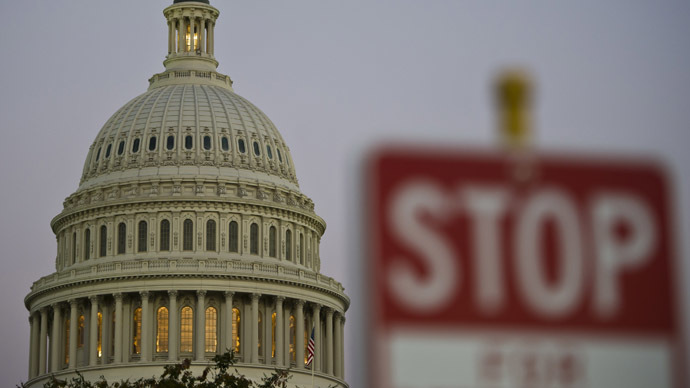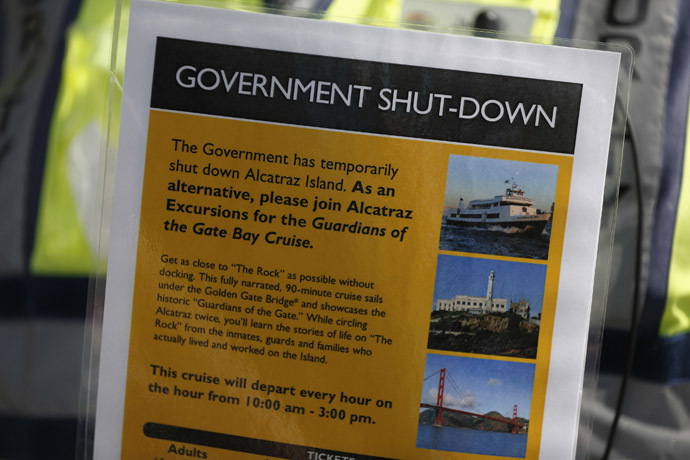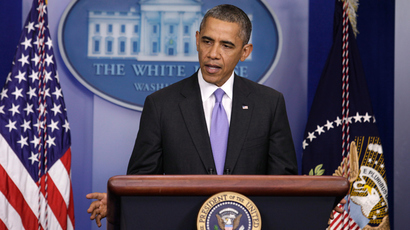Debt doomsayer: Treasury forecasts ‘back to 2008 recession or worse’ if US defaults

The US government default caused by the ongoing budget standoff in the Congress could have a "catastrophic” effect on the country’s economy, which would be felt for decades, the Treasury Department said in report.
The US government went on partial shutdown this Monday after the
Democratic-led Senate turned down repeated efforts by the
Republicans to pass a budget, constraining the implementation of
‘Obamacare’ – a healthcare law, which the president considers a
centerpiece of his political legacy.
If the Congress fails to raise the $16.7 trillion federal
borrowing limit by October 17, the government could begin running
out of money to pay its bills, which would result in an
unprecedented US debt default.
“In the event that a debt limit impasse were to lead to a
default, it could have a catastrophic effect on not just
financial markets, but also on job creation, consumer spending
and economic growth — with many private-sector analysts believing
that it would lead to events of the magnitude of late 2008 or
worse, and the result then was a recession more severe than any
seen since the Great Depression,” the Treasury said in a
report on Thursday.
The consequences of the default, which include high interest
rates, reduced investment, higher debt payments, and slow
economic growth, would also be sustainable and “could last for
more than a generation,” the department warned.
The Treasury said the “we may be starting to see some
tentative signs that the current debate is affecting financial
markets,” with the crisis already shaking the Wall Street
where the Dow Jones Industrial Average dropped 136.66 points
(0.90 per cent) to 14,996.48 on Thursday.
The Treasury also noted that the negative spillovers from an
“unprecedented” US default would “reverberate around the world”
as “credit markets could freeze, the value of the dollar could
plummet, US interest rates could skyrocket.”
The International Monetary Fund has also sounded the alarm over
the American debt crisis, which is putting the world economy
under threat.

IMF chief Christine Lagarde stressed that it is "mission
critical" to urgently find the way out of the stalemate – as
she arrived in Washington for the next week’s IMF and World Bank
meetings.
“The ongoing political uncertainty over the budget, over the
debt ceiling doesn’t help. The government shutdown is bad enough,
but failure to raise the debt ceiling would be far worse and
could very seriously damage not only the US economy, but also the
entire global economy,” she said.
According to Lagarde, the economic growth in the US has already
been hurt by excessive fiscal consolidation, and will be below 2
percent this year before rising by about 1 percentage point in
2014.
Congressional action remains the only way to avoid the US
default, an unnamed Treasury official told the reporters.
He stressed that the Treasury Department has no plans of using
the Constitution’s 14th Amendment, which says that the validity
of the US public debt “shall not be questioned,” to get
around the debt limit.
But there are no signs that the budget dispute will be solved
before being dragged into a second week, with all of the
government’s non-essential workers sent home due to the
shutdown.
Obama has refused to negotiate on raising the debt ceiling with
the Republicans, saying that offering concessions would set a
poor precedent for future heads of the White House.
"If we screw up, everybody gets screwed up. The whole world
will have problems," he said in his emotional speech on
Thursday, adding that the debt default would throw the US economy
back into a recession.
The president stressed that Republican House Speaker John Boehner
could bring the government back to work “in just five
minutes” by passing a temporary operating budget, but he’s
not doing it because “he doesn't want to anger the extremists
in his party.”
"Take a vote, stop this farce and end this shutdown right
now," he urged the Republicans.
Meanwhile, the Congress may pass a measure on Friday, which will
see federal workers receive back pay for the period when they’ve
been out of the office due to government shutdown.
Members of the House of Representatives and Senate have filed
bills that would ensure all federal employees receive retroactive
pay for the duration they’ve been off work.
‘Default will be avoided, but it’ll still hurt’
The US government is going to avoid debt default after all, but
the after-effect of the budget standoff in Congress may be
equally painful for the economy, Kenneth Levin, professor of
economics at City University of New York, told RT.
“I think there’s going to be a threat of default,” he
said. “I think they will let the October 17 deadline pass. I
think the Obama administration will find a way to get some extra
funding to avoid a default on the Treasury bonds,” he said. “But
at the same time, you know a write down or some sort of
devaluation of your investment is almost the same as a default.
There are different forms of default. If we have higher interest
rates, if we have a runaway inflation, if we have higher taxes,
if the value of the dollar falls – all of those are different
forms of default, but you don’t call it a default.”
In order to get the affordable health care act, the Obama
administration would have to make more concessions on the debt
ceiling if it wants the crisis to end, the professor stressed.
According to Levin, the real problem isn’t Obamacare or debt
ceiling, but the fact that “the American economy isn’t growing
fast enough to sustain all the demands on it, especially the
debt.”
“Just remember that the national debt has grown at the same rate
as household debt. So, there’s no tax pays or post-tax pays that
is a salary base for people to continue to pay all the household
debt and cover the national debt,” he said.
The US economy requires “significant restructuring” to
provide the necessary growth, but the professor isn’t sure the
issue will ever be addressed by the government.
Levin also mentioned that it isn’t the first time that the US
Congress hasn’t been able to pass the budget by October 1.
“It’s the 12th consecutive year that they failed to have met
[sic] the deadline,” he said. “The only reason there
hasn’t been a shutdown for the last 12 years, there’s always been
these temporary resolutions – that is a bill for six-week
temporary resolution that [Republican] speaker of the house, John
Boehner, is refusing to put before the Congress for vote right
now.”
With law providing no mechanisms to persuade the Republicans to
move on with the budget, the professor suggested that the current
situation in the Congress indicates “some sort of constitutional
crisis.”















